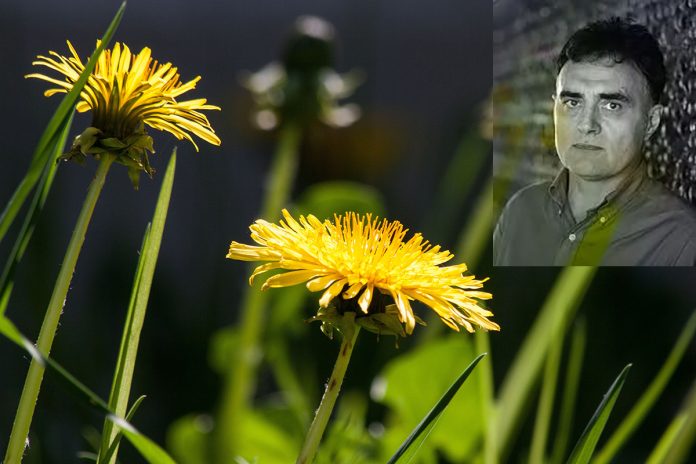Translated from Macedonian by Elizabeta Bakovska
“Do you know Nena?” my mother says before I take off my shoes and before I enter home. That is the question that she always welcomes us, her children, with; that is the question that always has the same answer. However, I am quiet now, and I look for the shoelaces in the mud—the street has been the same for ten years, mud up to your knees. You walk, and your feet slowly grow into lumps. There is asphalt only up to the house of the lawyer Nestor. Besides the mud, the question that our mother with a scarf on her head had waiting for us at the gate remained the same: “Do you know…?”
I know that Nena was the only daughter of Boris Nestorof, the oldest lawyer in our southern town. I know that she was as beautiful as a secret dream: bachelors compared her to a doe, the women to a filly, and we, the boys with just several hairs under our noses, although we were wet behind the ears to make such comparisons, we still knew that even the wind kneeled in front of her as a hungry dog. She was the only one that made the dandelions, which imprisoned the town in the spring and did not allow the honest people to blink, run.
I remember that it was spring. Clouds gathered under her armpits; Nena could even fly if she wanted. It was then that her father the lawyer Nestor publicly fell in love with the intern who learned the craft in his office and immediately decided not to lie to them, but to leave them. She, still small, and her mother, still young. He left from the house at the end of the asphalt with a single suitcase. At the gate, where Frosina Nestorof saw him off, he stopped, blinked and said: “I love you, but it happened.” And he left. He left to Lefteria Uzunova’s apartment, to his blond, long legged and always-smiling intern. That winter his daughter Arna was born, but he, to be honest, never forgot Nena, and never forgot Frosina. He always divided his money into two equal parts and always brought them alone to the house under ours. He would enter quietly, have some bitter coffee, they would keep quiet with his former wives sitting opposite each other, in the end they would ask about each other’s health, they would send greetings—he to Nena, and she to Arna, and then he would leave and she would look at him through the tears that created ledges on the window pane. Liljana’s mother, Frosina Nestorof, never remarried and never said a bad word about Boris, her husband, as she said, although he was not with them for years. She still loved him, but it was hard for her to admit this even to herself. Nena loved him too. She also grew to love her new sister. Later, when she studied in Skopje, it might happen that she did not have enough money for herself, but she always had money to buy a toy or a blouse for Arna. And Arna grew as her love for her grew. Nena finished university six months before the term. She could stay in Skopje, but she decided to return home. Warmed by the sighs of the boys, she blossomed like a lilac, and like a violet, and like a white rose, and when the whole city smelled like her, she married a young doctor, who knew how to caress her fragrant soul with his tame eyes even when he was quiet.
Again in the spring, again at the time when the smiles smell the best; when the camomile blossomed in our muddy street—Elena was born. She was born with hair like primula and little white arms that twinkled like little stars. When they all walked in the park smiling, Elena’s arms moved in their hands like little doves; her small heart climbed along their bodies. But it lasted for a short time. Because of an incorrect vaccine, and not because of a “sickness that could not be detected” as they claimed in the provincial hospital, Elena got sick with a heavy polio. Nena, as any mother, would not believe that those little white arms would be like dead birds in her daughter’s lap. Her husband, hiding in the corner of the room, just kept on sighing, while she looked for a speck of hope even in the wind with dandelions. It lasted for ten years. It was for that many years that Nena would not recognise her life; she would not recognise any answer as final. She lived with Elena’s small heart on her body, with her warm arm that came to hide in her lap like a little dove chased by the sudden rain in the park. One night she dreamt that her husband slowly crumbled drop by drop, he dripped while they walked with Elena, still a baby, together in the drizzle. The morning after this dream he left. He did not go far. He married a nurse in the neighbouring town, twelve years younger than him. He said: “The time passes and the only thing that changes is that we forget each other more and more with every passing day. I know that one day both you and I will forget that we existed. Elena does not know how to remember!” and he tried to kiss Nena for the last time as he departed, but he could only collect his glasses as they fell on the stairs before she closed the door. Elena and Nena remained alone. The only measure of this sorrow was Frosina Nestorof, who could not see well any longer, although her tears still created ledges on the window pane. Although the lawyer Nestorof offered her money and friends to place Elena in a hospital for children who do not grow old, it took Nena six years before she listened to the advice of the doctor who had treated Elena for almost seventeen years and, tired with sorrow and all the defeats, she finally took her daughter to the hospital where one does not go for treatment. There she milled around the fence for days, she looked for the windows from where she could see the hair heavy as a bundle of primulas. Hiding among the pine trees she felt only the small heart crawling on her body.
Three more years passed, but she would not marry even if thirty more passed, if it were not for Frosina’s tears on the window, if it were not for her misty pledge decorated with wrinkles on her face. Nena married once again just when the town was full with dandelions. The man had two small children. She shared the all the love that she her daughter Elena could not enjoy between their chirping little noses. During the weekend, they all hurried to visit Elena in the hospital. The two little girls, as little birds, pushed her wheelchair in the park around the pavilion.
I know that it was at the end of such a weekend, the night when they returned home, that they found poor Frosina Nestorof dead. She had been looking at the gate, standing next to the window. The next day, at the funeral, when our mother called us to see her off, Boris also came. And he cried, loud, as a child, he cried crumbled on the side with his stick. He remained alone at the grave, looking at the cross as if caressing Frosina, and she did not have any tears to recognise him now. Maybe he still loved her although they had not been together for thirty years. Maybe Frosina also felt something as she looked at the gate standing by the window. Martin, Nena’s former husband, also came to the funeral. He stood under the acacia trees, as if he had no courage for condolence. It could be seen that there, among the people and the tombs, that he looked for the wheelchair, the hair heavy as a bundle of primulas.
And then it also happened. The spring when Arna Nestorof, Nena Nestorof’s half-sister married, the poor Elena died. They found her naked in her wheelchair. She had been looking at the sunrise and crying. Her tears were still warm when they covered her with a hospital sheet, with a sheet that had a blue line in the middle. For seven days Nena ran to collect various requests and statements, pushing her tears inside, and it was on the seventh day that she managed to take her dead daughter from the hospital. She managed to save her from a common grave for those who did not know their names. Although the poor girl was a woman already, she actually never found out that there was death. Death as the one that came as she watched the sunrise, as her small child’s soul rolled in the dew in front of her inexperienced eyes.
From here everything started to move incredibly fast. Boris Nestorof died ten years later. Then the sorrow and the pain that grew inside Nena popped like a dandelion and the sorrow spread through the town with the wind. My southern town smelled like this on the day I came to see what my mother was doing in our big house with windows of silence. The same wind with dandelions encountered me, actually, every spring when I arrived with the afternoon bus. Passing through the line of trees from the bus station to our house I watched the obituaries with a fear that I would be met by a smile that I knew for a long time, hanging on a tree. Led by this fear, I came as quickly as I could; however, unfortunately, every spring more and more of the familiar smiles expected me on the trees as I came home. I arrived home, as I just did, my mother, panting with joy that I had come, immediately asked her first-and-always-same question:
“Do you know Nena?” she says.
“Why?” I say.
“She died!” she says and closes the black door behind us.
Outside, in the yards, down our street and through the street to Nestorof house, numberless quiet dandelions twinkled as scared snowflakes. The season of dandelions had started.
About the author:
Blaze Minevski (1961, Macedonia) is the author of the novels “Me, Lenin and Mickey Mouse”, “We Should Have Taken a Photo before We Started Hating Each Other”, ”A Story about a Third Party, “The Mark” and ”The Performers”. The novel ” The Mark” in 2007 won the award “Stale Popov” for the best book of prose, given by the Macedonian Writers’ Society, the award “Novel of the year” given by the newspaper ‟Utrinski Vesnik” and the award ”13th of November” given by the City of Skopje.
















